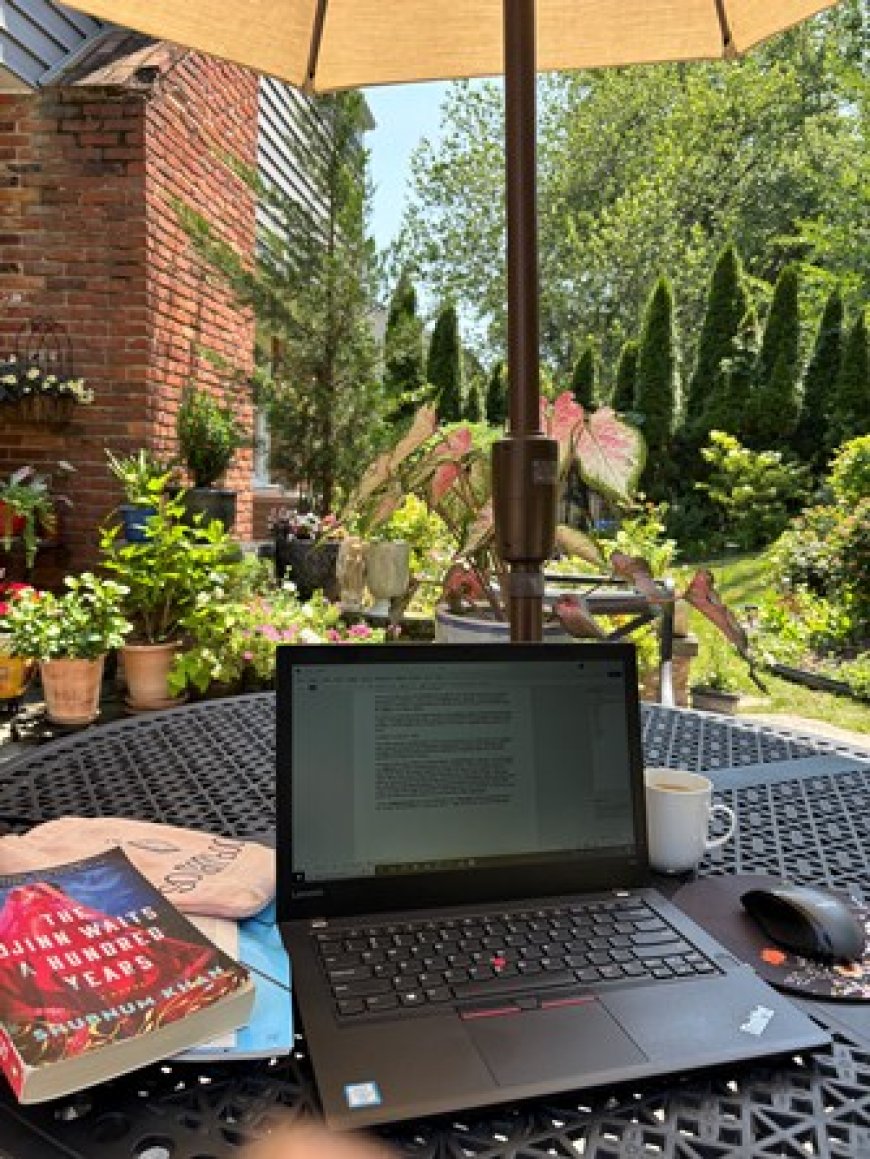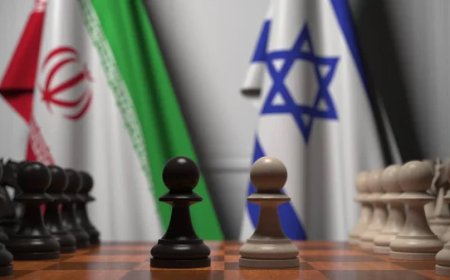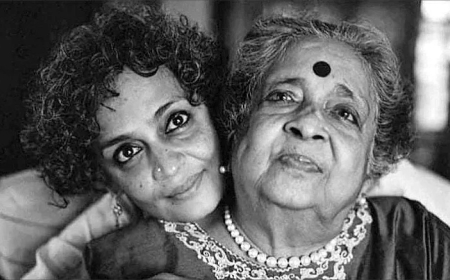A metaphorical presence
Reflections on The Djinn Waits for a Hundred Years, a haunting, lyrical novel blending family secrets, loss, and magical realism, set in a decaying mansion by the sea -- where love, memory, and womanhood quietly shape every story

When I pass by a bookstore or a garden center (it used to be vintage stores years ago), I need to take a pause and go inside to have a brisk look. Sometimes I am in a rush and have no time to indulge myself. Yet I go inside for at least a couple of minutes.
While busy running some errands the other day, I was passing by Barnes & Noble. I entered the store, and my eyes caught sight of a book on the display table. I picked up the book. It had an eye-catching book cover. Holding it, I was mystified. How uncanny! It was just this morning that I was chatting with my friend Nive. She was on the other side of the globe sitting in Mumbai, and I was at my desk having my morning tea. She had just finished reading The Djinn Waits for a Hundred Years.
Nive and I have been friends since 2007. Our close-knit group of four friends included two others, an American and a Dutch. We met each other in Bangladesh when our spouses took field assignments and moved there to work for a few years (I was an expat in my own country). Then, in 2010 we all left Bangladesh as our respective spouses finished their projects and headed back to their headquarters in different continents. But we ladies kept our friendship continuing online. Sometimes we post pictures of our families on WhatsApp and share our notable events as they happen, mention our travel plans, and names of recently watched movies or books we have enjoyed reading.
“It is the only one copy we have,” said the sales associate. I was a bit disappointed as I wanted to get a fresh copy. Well, I bought that only available copy.
The Djinn Waits for a Hundred Years is based on the dynamics in a multi-generational Indian family -- their loves and griefs, infused with Islamic mythology against the backdrop of South Africa. Over a timeline of events between 1914-1932 and 2014, the book intertwines, with the 21st century, the relationships and dynamics within a 20th century family and the omnipresence of an invisible character who has lived in Akbar Manzil for a century. The house was once a grand estate overlooking the sea in the east of South Africa.
I opened the book and stumbled upon these words: “The djinn pauses, then it uncurls its limbs, swings open the cupboard, and steps out.” Enchanted with Shubnum Khan’s lyrical prose, I read on. Her artful writing packed with emotions stirred my core. I started to see the ceiling beams and furniture of the house and could even smell burn crabs scuttling along the walls of the dilapidated house.
She personified the house as a character and an entity, which intermittently voices its opinion about things: “The house watches all this with a peculiar kind of horror. It knows that things cannot remain the same forever. It has watched from its high perch how the town below changed over the years. It has seen roads cut through the landscape, buildings erupt, and people multiply.”
I catch a whiff of magical realism and the novel Rebecca by Daphne du Maurier came to mind.
In 2014, after her mother passed away, Sana, the fifteen-year-old protagonist, set out with her widowed father Bilal for a new home. They rented rooms in Akbar Manzil. Akbar Manzil was built by an Indian businessperson Akbar Ali Khan who owned a sugar mill. Over many decades the mansion went through many renovations and was transformed into a building containing many apartments.
Sana started living in the building in Durban, an eastern city on the Natal Bay of the Indian ocean. There were other quirky tenants -- quarreling old ladies, a pianist, the doctor who had worked in war zones, Pinky who is obsessed with romantic Bollywood movies.
In the East Wing of Akbar Manzil, there was a door that had remained locked for decades. Sana unlocked the door and went inside discovering a bedroom frozen in time. She found diaries and photos and gradually unearthed the religious and cultural tensions among the inhabitants of the house. She learns about the tragic fate of Akbar Ali Khan and his two wives, Jahanara and Meena. I get a glimpse of The Historian, the story of a sixteen-year-old girl who was also motherless and submerged into the secret of her family’s past, a book by Elizabeth Kostova that I read more than a decade ago.
“Bilal is reading a recipe book by candlelight. He runs his finger under the ingredients for a red fish curry. He says the words “curry leaves” several times to himself in a low voice. He imagines how it will cook. The burned tinge of frying garlic, the hiss of mustard seeds as it hits the oil, the way the turmeric spreads across the vagaar in hot yellow streaks. He closes his eyes and remembers her scent, that particular smell of bittersweet sweat after a walk. It changed towards the end; a twist of chemical lemon, the antiseptic of never-ending hospital corridors. He falls asleep with the recipe book on his chest, his glasses still perched on his nose.”
My heart is smitten as I read.
The Djinn Waits for a Hundred Years is not just a novel of distress or a mystic story. Shubnum Khan uses her writing skill and flawlessly intertwines the romance and love: between family members, between the dead and the alive, between an enigmatic figure who had haunted the mansion for a century.
Woven throughout the novel is a common theme -- the powerlessness of women. I am impressed by Shubnum’s assertion of womanhood with such subtlety and profoundness. In the novel, Sana and her mother were never close, she always believed her mother had kept her at a distance.
Bilal, her father, tried to whisk away Sana’s angst: “She knew you were afraid of water. She said it was her fault somehow. She told me girls could not have weaknesses, that the moment they did, someone would take advantage. A girl has to be strong if she’s going to survive this world, she said. She made me promise I would take you to live by the sea, so that every day when you looked out at the water you would become a little more brave.”
As I read the novel, it kept haunting me with melancholy but also made me see how love is the transcendent connector of human relationships.
Yet, discontent was lingering in me. I wish I could know more about the Djinn!
Perhaps it was there as a metaphorical presence for the hopes and desires, and the fears and frustrations of all those who once inhabited the great Manzil by the sea.
What's Your Reaction?


















































































